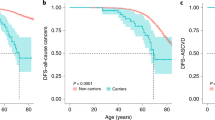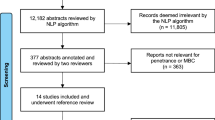Abstract
The FMR1 gene has been studied extensively with regard to expansions and premutations, but much less research has focused on potential effects of low CGG repeat length. Previous studies have demonstrated that BRCA1/2 positive women are more likely to have an FMR1 genotype with one low CGG allele, and that women with both FMR1 alleles in the low CGG repeat range are more likely to have had breast cancer compared to women with normal numbers of CGG repeats. However, there has been no research as to whether low CGG repeat length impacts cancer risks in men. Therefore, this study aimed to examine cancer incidence and related risk factors in men with low CGG repeat length in the FMR1 gene. We utilized subject data from the Marshfield Personalized Medicine Research Project to compare cancer-related diagnoses between 878 males with low CGG repeat length (< 24 repeats) and 368 male controls with CGG repeats in the normal range (24 to 40 repeats). We utilized ICD-9 codes to examine various cancer diagnoses, family histories of cancer, other non-malignant neoplasms, cancer surveillance, and genetic susceptibility. Men with low CGG repeats were identified to have significantly higher rates of family history of any cancer type (p = 0.011), family history of any BRCA-associated cancer (p = 0.002), and specifically, family history of prostate cancer (p = 0.007). The mean number of BRCA-associated cancer diagnoses (breast, prostate, pancreatic, and melanoma) per individual in the low CGG group was slightly higher than that of the control group, with this difference trending toward significance (p = 0.091). Additionally, men with low CGG repeats had significantly higher rates of connective/soft tissue neoplasms (p = 0.026). Additional research is needed to replicate the observations reported in this preliminary exploratory study, particularly including verification of ICD-9 codes and family history by a genetic counselor.
Similar content being viewed by others
References
Brown, W. T. (2002). The molecular biology of the fragile X mutation. In R. J. Hagerman & P. J. Hagerman (Eds.), Fragile X syndrome: Diagnosis, treatment and research (3rd ed., pp. 110–135). Baltimore: Johns Hopkins University Press.
Cavanagh, H., & Rogers, K. M. A. (2015). The role of BRCA1 and BRCA2 mutations in prostate, pancreatic, and stomach cancers. Hereditary Cancer and Clinical. Practice, 13, 16.
Dagan, E., Cohen, Y., Mory, A., Adir, V., Borochowitz, Z., Raanani, H., et al. (2013). BRCA1/2 mutations and FMR1 alleles are randomly distributed: a case control study. European Journal of Human Genetics, 22, 277–279.
Fiederling, J., Shams, A. Z., & Haug, U. (2016). Validity of self-reported family history of cancer: a systematic literature review on selected cancers. International Journal of Cancer, 139, 1449–1460.
Gleicher, N., Weghofer, A., & Barad, D. H. (2010). Ovarian reserve determinations suggest new function of FMR1 (fragile X gene) in regulating ovarian ageing. Reproductive Biomedicine Online, 20, 768–775.
Gleicher, N., McAlpine, J. N., Gilks, C. B., Kushnir, V. A., Lee, H. J., Wu, Y. G., et al. (2014a). Absence of BRCA/FMR1 correlations in women with ovarian cancers. PloS One, 9, 1–8.
Gleicher, N., Weghofer, A., & Barad, D. H. (2014b). Do BRCA1/2 mutations and low FMR1 alleles interact or not? European Journal of Human Genetics, 22, 155–156.
Howlader, N., Noone, A. M., Krapcho, M., Garshell, J., Miller, D., Altekruse, S. F., et al. (2014). SEER cancer statistics review, 1975–2011. Bethesda: National Cancer Institute.
Kerber, R. A., & Slattery, M. L. (1997). Comparison of self-reported and database-linked family history of cancer data in a case-control study. American Journal of Epidemiology, 146, 244–248.
Levy-Lahad, E., & Friedman, E. (2007). Cancer risks among BRCA1 and BRCA2 mutation carriers. British Journal of Cancer, 96, 11–15.
Maddalena, A., Richards, C. S., McGinnis, M. J., Brothman, A., Desnick, R. J., Grier, R. E., et al. (2001). Technical standards and guidelines for fragile X: the first of a series of disease-specific supplements to the standards and guidelines for clinical genetics laboratories of the American college of medical genetics. Genetics in Medicine, 3, 200–205.
Maenner, M. J., Baker, M. W., Broman, K. W., Tian, J., Barnes, J. K., Atkins, A., et al. (2013). FMR1 GCC expansions: prevalence and sex ratios. American Journal of Medical Genetics. Part B, Neuropsychiatric Genetics, 162B, 466–735.
Mailick, M. R., Hong, J., Pathouz, P., Baker, M. W., Greenberg, J. S., Smith, L., et al. (2014). Low-normal FMR1 CGG repeat length: phenotypic associations. Frontiers in Genetics, 5, 309.
McCarty, C. A., Wilke, R. A., Giampietro, P. F., Wesbrook, S. D., & Caldwell, M. D. (2005). Marshfield clinic personalized medicine research project (PMRP): design, methods and recruitment for a large population-based biobank. Personalized Medicine, 2, 49–79.
Oktay, K., Kim, J. Y., Barad, D., & Babayev, S. N. (2010). Association of BRCA1 mutations with occult primary ovarian insufficiency: a possible explanation for the link between infertility and breast/ovarian cancer risks. Journal of Clinical Oncology, 28, 240–244.
Park, L. S., Tate, J. P., Rodriguez-Barradas, M. C., Rimland, D., Bidwell Goetz, M., Gilbert, C., et al. (2014). Cancer incidence in HIV-infected versus uninfected veterans: Comparison of cancer registry and ICD-9 code diagnoses. J AIDS Clinical Research, 5, 1000318.
Ricci, M. T., Pennese, L., Gismondi, V., Perfumo, C., Grasso, M., Gennaro, E., et al. (2014). The FMR1 CGG repeat test is not a candidate prescreening tool for identifying women with a high probability of being carriers of BRCA mutations. European Journal of Human Genetics, 22, 280–282.
Seltzer, M. M., Baker, M. W., Hong, J., Maenner, M., Greenberg, J., & Mandel, D. (2012). Prevalence of CGG expansions of the FMR1 gene in a US population-based sample. American Journal of Medical Genetics. Part B, Neuropsychiatric Genetics, 159, 589–597.
Weghofer, A., Tea, M. K., Barad, D. H., Kim, A., Singer, C. F., Wagner, K., et al. (2012). BRCA1/2 mutations appear embryo-lethal unless rescued by low (CGG n<26) FMR1 subgenotypes: explanation for the “BRCA paradox”? PloS One, 7, 1–7.
Acknowledgements
This work was conducted as a part of the degree requirements and training completed at the University of Wisconsin Genetic Counselor Training Program. This research was supported by the Centers for Disease Control and Prevention through the Association of University Centers on Disability (Marsha R. Mailick, PI). We would like to thank the Marshfield Personalized Medicine Research Project research team for providing access to data from the PMRP, and their ongoing efforts in gathering this invaluable data. We would also like to thank all of the men who have participated in the PMRP. Support was also provided by the Wisconsin State Laboratory of Hygiene and the Waisman Center Core Grant (U54 HD090256). Lastly, we would like to thank Amy Stettner, Erin Borchardt, and Laura Pfleger for their helpful feedback and discussions.
Author information
Authors and Affiliations
Corresponding author
Ethics declarations
Conflict of Interest
Authors Hallee Adamsheck, Elizabeth Petty, Jinkuk Hong, Mei Baker, Murray Brilliant, and Marsha Mailick declare that they have no conflict of interest.
Human Studies and Informed Consent
All procedures followed were in accordance with the ethical standards of the responsible committee on human experimentation (institutional and national) and with the Helsinki Declaration of 1975, as revised in 2000. Informed consent was obtained by PMRP from all patients for being included in the study. Subjects were consented to genetic testing when enrolled in the PMRP and results of any testing will not be returned to research subjects.
Animal Studies
This article does not contain any studies with animals performed by any of the authors.
Rights and permissions
About this article
Cite this article
Adamsheck, H.C., Petty, E.M., Hong, J. et al. Is Low FMR1 CGG Repeat Length in Males Correlated with Family History of BRCA-Associated Cancers? An Exploratory Analysis of Medical Records. J Genet Counsel 26, 1401–1410 (2017). https://doi.org/10.1007/s10897-017-0116-5
Received:
Accepted:
Published:
Issue Date:
DOI: https://doi.org/10.1007/s10897-017-0116-5




